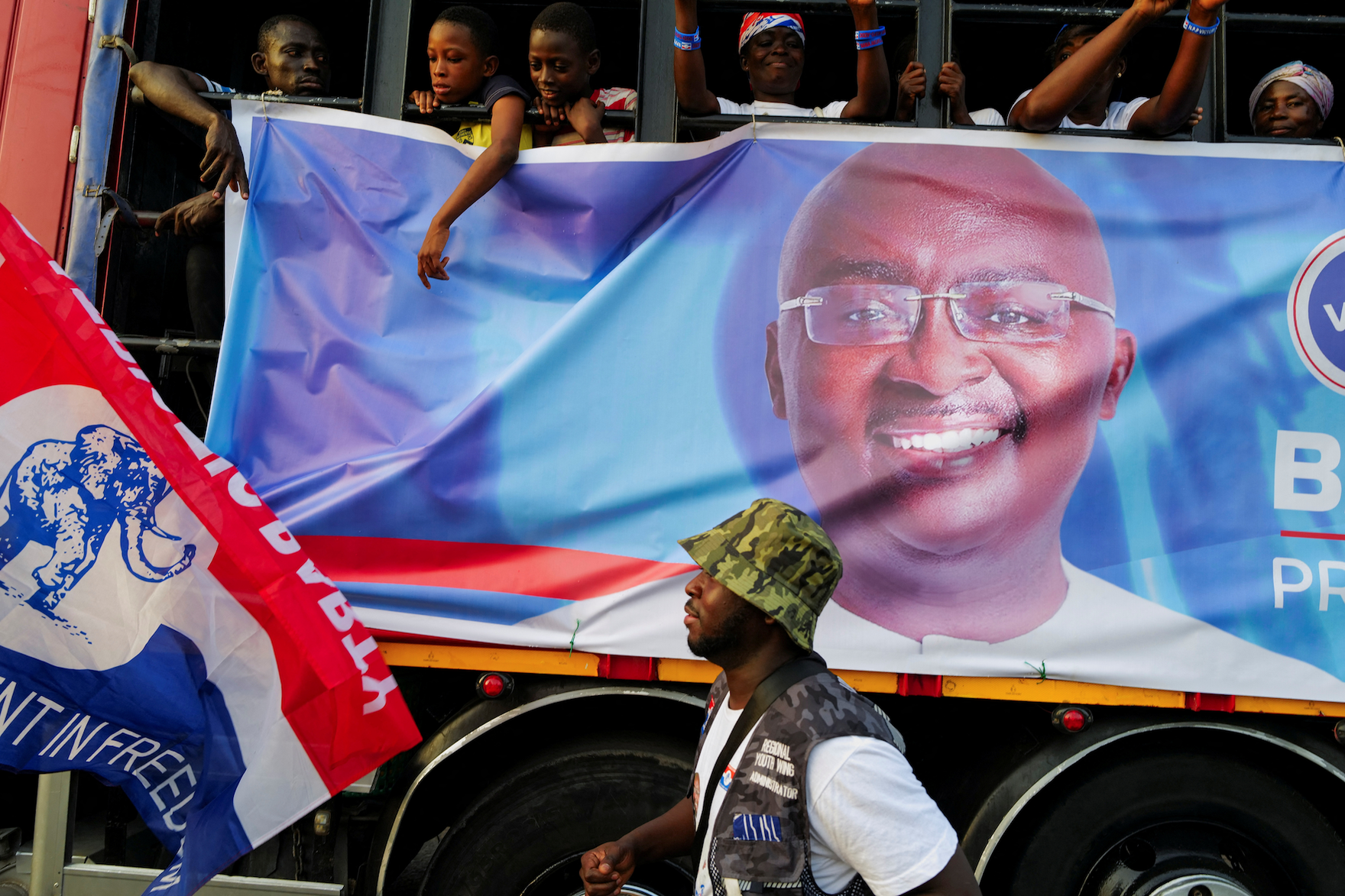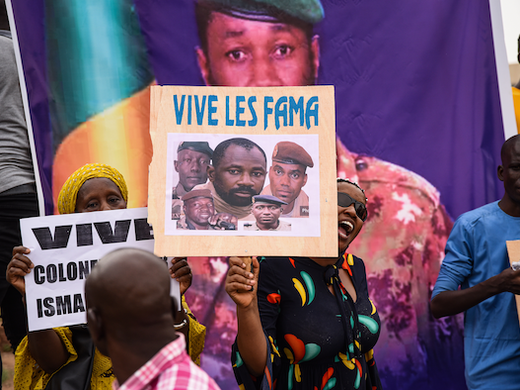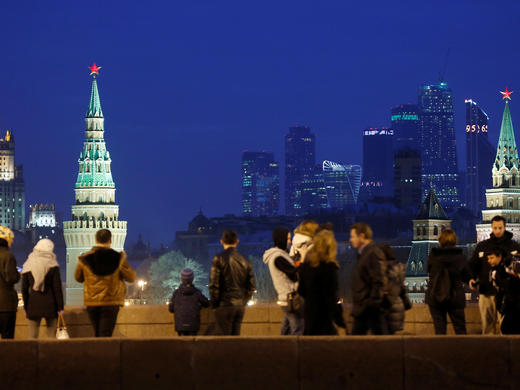On December 7, Ghana will hold presidential and parliamentary elections. By conventional wisdom, the economic pinch points felt under Ghana’s ruling New Patriotic Party (NPP) government, the poor assessments of government performance in key policy areas as well as the governance environment as captured by the three most recent Afrobarometer surveys in Ghana (2019, 2022 and 2024), all strongly suggest Ghana’s main opposition National Democratic Congress (NDC) candidate, John Dramani Mahama, has the edge.
Also keep in mind that 2024 ends another eight-year cycle where Ghanaians vote for party turnover as they have done previously (2000, 2008 and 2016). The NPP and its candidate, Mahamudu Bawumia, have expressed determination to end this cycle by coining the phrase “break the 8.”
It is in this politically competitive environment, in my opinion, that technology is being deployed by these two parties to court voters.
While browsing Facebook on November 25 and 26, I chanced upon two campaign ads. One depicted the NPP as pro-LGBTQ+ rights and ended with a call on voters to vote for the NDC. The second portrayed the NDC’s presidential candidate as pro-LGBTQ+ rights and urged Ghanaians to vote for the NPP to protect family values.
Two things are perplexing about these ads. First, both the NDC’s and the NPP’s presidential candidates have explicitly stated their opposition to same-sex relationships on grounds of their faith. Second, their positions can be easily verified on YouTube, Facebook, X and the websites of several media platforms. This begs the question: Why such messaging?
These duelling political ads are symptomatic of the paradoxical nature of political competition in Ghana in the age of technology and social media. On the one hand, it has democratized access to and eased the dissemination of information. But on the other, it has also ushered in a period of misuse, to gain political advantage.
There are two questions for reflection. First, how do citizens make peace in this new environment? Second, what tools of public policy should state actors deploy to deal with misuse, without appearing to stifle free speech?
A Messy Environment
The NPP and the NDC are deploying social media in similar ways — for campaign messaging and information sharing about electoral activities, and as pseudo-news channels for livestreaming campaign events. These are positive developments for political competition. However, these platforms are also being used in ways that are potentially unhealthy for political competition and Ghana’s democracy. Why do I say that?
It is common to see the two campaigns regularly flag information and stamp it with “FAKE NEWS” in red capital letters. Consider a statement attributed to the NDC presidential candidate in which he allegedly expressed disappointment over the president’s failure to visit the Volta Region during a natural disaster. The region is a party stronghold of the NDC in southern Ghana. It is also dominated by the Ewe ethnic group. Ghana’s outgoing president, Nana Akufo-Addo, is an Akan and his party, the NPP, has sometimes been tagged as pro-Akan.
Although there is no rivalry between the two groups, ethnic sentiments have sometimes been weaponized politically to cause dissatisfaction for the NPP in the region. The NDC always wins the region by wide margins, but I suppose for the purveyors of misinformation, creating the impression of anti-Ewe sentiment amplifies any existing political dissatisfaction for the NPP.
Videos have also been altered or taken out of context to mischaracterize the words of candidates or prominent party supporters.
Also consider the allegation of NPP candidate Bawumia, making claims that Ghanaians are very comfortable under the current government. This amounts to talking from both sides of his mouth, as he has previously acknowledged the challenges facing the country even if not as forcefully as some would like.
Videos have also been altered or taken out of context to mischaracterize the words of candidates or prominent party supporters. In a recent TikTok video, the caption boldly claimed a prominent NDC member had endorsed the NPP presidential candidate. Yet it is clear, if one watches the original video in full, that claim is untrue.
Who are the purveyors? In many cases, it is difficult to determine who is behind the sharing of these videos and the origins of the misinformation and disinformation. Sometimes fake accounts bearing the names of prominent party persons or media houses are used. Partisans regularly accuse each other of being the perpetrators. However, the social media pages and handles of partisans become the conveyor belts, because they regularly share the misinformation and disinformation until it becomes flagged as fake news. It is an irony that the very people who hurry to flag news as fake are themselves spreading it. In all this, what the purveyors fail to appreciate is the damage that results from their activities.
Finding Peace in a Messy Environment
Ghanaians increasingly view social media with deep skepticism. According to the Afrobarometer survey, reliance on social media as an everyday source of news increased from 12 percent of the population to
30 percent between Round 6 (2014) and Round 9 (2022).
In Round 8 (2019), though, views about social media were mixed. On the one hand, 92 percent of Ghanaians agreed or strongly agreed that social media makes people more informed about current events, while another 81 percent agreed or strongly agreed that such media helps people have more impact on political processes. But there was also deep skepticism. Only 10 percent of Ghanaians expressed “a lot” of trust in information from social media; 65 percent believe users intentionally spread false information “sometimes/often”; 86 percent agreed or strongly agreed that social media makes people more likely to believe false news; and 65 percent agreed or strongly agreed with the statement that social media makes people more intolerant of those who have different political opinions.
The social media questions were not repeated in subsequent Afrobarometer survey years (2022 and 2024) and so it is difficult to state how these sentiments have changed over time. But it is clear Ghanaians are finding ways to live in this new, messy environment.
How Should the State Respond?
Technology has democratized Ghana’s information superhighway. No one person or entity controls how information is disseminated in the country. The unfortunate downside is that there seems to be no self-restraint among some political actors when it comes to misusing technology to gain political advantage. If left unchecked, this can lead to a proverbial “tragedy of the commons.”
What policy tools have been deployed to deal with this? There have been some public education efforts by the National Commission for Civic Education and the Ministry of Information. Law enforcement tools are yet to be fully deployed to combat this problem, beyond a call by the minister of communication and digitalization on the National Communications Authority, Ghana Police Service and Attorney-General’s Office to collaborate, identify and punish the purveyors of misinformation and disinformation using provisions contained in the Electronic Communications Act.
Recently, though, the police arrested a journalist who “informed” listeners that the election was being held on two different dates — one for the NPP presidential candidate, and another date for all other candidates. It will be interesting to see what comes of the case.
All these efforts and calls are commendable, but to what effect? Misinformation and disinformation have not stopped, and citizens continue to be at the mercy of the purveyors. Perhaps it is a little too late for this election. Maybe the lessons of 2024 will dictate how citizens resolve this dilemma. Time will tell how state actors combine the tools of public policy to deal with this new era of political competition.



